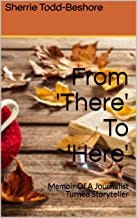DEEPER END…The Calgary Sun-Mirror
I left my weekly column behind with a mixture of regret and relief.
The regret part, certainly understood by any writer reading this - was directly attached to the opportunity the publishers of The Whitecourt Star - a regional weekly newspaper, gave to a virtual unknown. He and his wife were both brave and bold.
Some of my column topics the publisher asked if I would tackle while others were ideas of my own. Reading through them it might be easy for you to pick out local issues the publisher asked me to address. While others were clearly subjects for which I had developed a passion.
In hindsight I should have published all of my columns and features using my maiden name, however, I didn’t think about that early on. [That “I” not my work was the “Brand” was still not understood.] In 1980 we lived in a small town [population 5,000] and my [then] husband was the area field manager for The [Provincial] Energy Resources Conservation Board. Having a vocal wife with a recognizable surname made him uncomfortable, though – to B.W’s credit he never asked me to stop.
The relief I felt [momentarily] was the doubt that kept returning each week that I could think of then write anything interesting or relevant.
I have since learned that [a.] every writer feels much the same doubt and [b.] that doubt never goes away – which is actually good. Those clouds of doubt hovering just above the head of every writer I’ve met, is healthy. So long as your doubt doesn’t stop you from writing - it actually prompts you [well me at least] to strive to write the next feature, the next column or next book as engrossing or more enthralling than the last. I strive to improve and endeavor to progress, constantly.
For me that shadow of doubt has been a self-inflicted form of quality control. People may praise my work or criticize my work, but I always want my readers to ‘get something’ from my work. And – personally I want to avoid wasting any reader’s time.
Nevertheless, beyond regret or relief or doubt something else had happened to me during my 168 weeks writing a regular column – something had shifted. Actually the ‘shift’ had begun with my three years on The Static, but became deeply rooted when someone not only published what I wrote and paid me to write, then kept paying me and publishing what I wrote.
I not only was a writer, I now ‘thought’ of myself as a writer. I remember the first time that I actually acknowledged that fact. I had tagged along with Hubby to an oil and gas conference in 1983. During a social mingling of attendees with their spouses someone asked me what I did. Out of my mouth came the words, “I’m a writer.”
Along with my own surprise, there was an awkward dazed expression on the faces of the other three people standing by the appetizer table with me…As I’ve said before, I learned that everyone knows how to respond to an accountant or teacher or hair stylist or plumber – but hardly anyone knows what to say when you tell them, you’re a writer. Not sure why.
A rare, curious and confident person will ask, “What do you write?” letting everyone else off the uncomfortable hook. But most people only nod then during the awkward silence the subject gets changed, usually by me asking what they do.
However, at this gathering I realized it had been more than three years since I had written much of anything, except some draft chapters for a fiction plot in a three-ring binder that would eventually be published years later as: “SHADOWS AND LIGHT”.
Returning home, I was prompted to dust off my small portable blue typewriter and stick my neck out to test myself further. And because my first professional break had been with a weekly newspaper, once again I targeted a weekly. The Mirror a city-wide newspaper was published as a supplement for various Calgary communities by The Calgary Sun.
This time I had a scrapbook of Whitecourt Star column clippings. Those clippings became a huge part of my writing resume. Monthly, weekly and daily publications need to know writers can be consistent contributors and meet print publishing deadlines.
Along with five new column feature ideas I included photocopies of five of my favorite columns published in the Whitecourt Star. Nervous, I mailed everything along with a short cover letter to Harry Pegg, the Mirror Editor.
*I then crossed my fingers – which in truth is how most of us/writers send off our job requests, or query letters. However, two weeks later the phone call from Harry Pegg, the editor of the Mirror still caught me off guard.
I was prepared for a nice letter with, thanks, but no thanks. I was not prepared for a personal phone call. And certainly not a phone call from someone who liked my work then asked when it would be convenient for me to meet with him at his office at The Mirror to discuss details…
My vision was quite blurry when I first checked my kitchen calendar. I struggled to remain sounding calm – as if newspaper editors with a readership circulation of 400,000 [plus] had called me many times before…
We set a date and a time and after he hung up, I sat on my kitchen floor slightly shaky, still holding the phone receiver and working to recollect my bouncing brain cells. Because in one phone call I committed to not only writing yet another weekly column, but this time for a readership 30 times greater than my first run.
I was still freelance not staff, but my pay went from $10 per week in 1980 to $25 per week in 1985.
Seen now, from the perspective of 2020+ money, $25 might appear pointless. However, a dollar bought oh so much more four decades ago, but more importantly my audience went from a circulation area of 12,000 readers to over 400,000 readers. My opportunity had immediately stretched out to an area that spanned a great deal of south-central Alberta.
Then - the responsibility of my new commitment ‘hit’ me! If I messed up, far more people would also be witness to that as well...
At my first meeting with Harry Pegg and his assistant editor [Kit Poole] we talked as easily as if we had known each other for years instead of minutes. That type of instant ease is always a good ‘sign’.
And if you want to get a feel for ‘who’ the Mirror editor was then watching the movie “All the President’s Men” will give you a good idea. Harry Pegg was an old-school journalist from whom I learned so much. He was a generous, unselfish mentor.
My next column – my first for The Mirror was set to appear early in the New Year 1985. This column was renamed: …that’s life - all in lower case. Of my first five samples the editor had selected this as one for my Mirror column launch.
………
THE mirror___________________March 4, 1985 Calgary’s Community Magazine
…that’s life - Now old Ralph is specializing.
The ‘creeps and bums’ king, Mayor Ralph Klein rides again.
His Honor, Sir Pied de la Bouche was not satisfied with just one-third of the general populace of Upper and Lower Canada scowling at us with wet feathers, now he is specializing.
Our hero and champion of voter virtue should, if nothing else be commended for riding to our civic rescue. The mother-hen of Calgary City Hall certainly has the protection of the local farmyard uppermost in his hayloft.
It is a popular misconception that wheat, cattle and oil put this city of the great white hat on the map. Nothing could be farther from the truth. Lately we are remembered for our mayor, qui parier avec le fleche. Outsiders curse him everyone.
The mayor however is slightly mistaken on a few vital points. Although I am not prepared to debate whether or not the banking brass are ‘creeps and/or bums’ [I know so few that well] the top executives cannot rightfully be accused of “leaving town” because they were never really here to begin with.
To explain we must return to the scene of the original sin – circa 1792 BC, give or take a year. King Hammurabi of Babylon, a noble protector of his flock [not unlike our own civic custodian] set to music one of the earliest codes of banking. Allow me to quote: “If a man owe a debt and a flood shall inundate his field and carry away the produce, in that year he shall not make any return of grain to the creditor.”
Replace ‘flood’ with ‘high interest rates and Marketing Board interference’ then let’s see a show of farmers who would gladly give their potato eyes for a deal like that with their local lender.
Progressing swiftly in time to around 1000 BC we find third party banking well established. Seed could be borrowed then repaid after the harvest with interest or the eldest daughter, whichever had more value.
After the decline of the Roman Empire [which we cannot in anyway attribute to the banking system – war and decadence claim credit there] until the 11th Century, bankers were mainly moneychangers. Which explains the popularity of the shell game. If you can decipher what the computer did to your account, then you might live long enough to see it rectified.
Moneychangers provided a vital service all across Europe from market to market. Silver and gold coins were slightly unwieldy to tote from place to place. Coins were also a magnet to certain elements who extracted withdraws at the point of a sword – so the ‘banco’ [or simple outdoor bench] became a clearing house. Verified letters of exchange became negotiable.
Ta da! The beginning of paper money and the end of balanced treasuries. And – banks have had an ongoing love affair with worthless piles of paper ever since.
Moving closer to our mayor’s objections to bankers – with the emergence of British banker Sir Thomas Gresham in the mid 16th Century came the birth of banking double talk. Quote: “Bad money drives out good.” This designed a shroud of mystery around money which has endured to this day. Just a little ‘slight-of-word’.
Sailing across the choppy Atlantic to the new world, we find Samuel Zimmerman, an airy monetary magician salting financial roots in Upper Canada. In 1852, he and several mentally afflicted politicians became entwined in the Great Southern Railway scam. In minor defense of some of the elected targets – they were duped.
With the railway came among other things, the long arm of the green, from sea to shining sea as it were. Transportation, mining, construction and speculation [raked over by the rogues and rascals from our early banking history] were lucrative favorites. And because they didn’t care to rough it without carriages and gas lit cobblestone streets, bankers became firmly entrenched in the East. “Go West.” was meant for the homeless, the penniless and the disinherited.
Early Canadian banking deposits were safe from everyone except the bank itself. Currency hocus-pocus gestates at the highest treasury levels. Save the reverence for churches. Now who would swallow that a salesman wished he could sell more and cheaper cars? So why should we believe a banker who says he wishes he could arrange more and cheaper loans?
“Creeps and bums?” Oh gee, maybe it’s unfair that we hold the shady beginnings of bankers over their collective heads like a leaky roof. Australia was originally colonized by convicts, conmen and social misfits and it is to the Aussies’ credit that they evolved as a valued global member. Therefore, it is not for us to lose hope for the big-five Canadian banks and their cohorts...
………………….
About-Me (patchworkpublishing.com)





